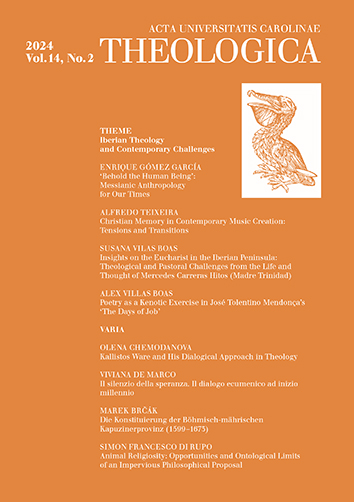AUC Theologica is a peer-reviewed journal for theology published twice a year. As we publish original papers in English, German, French, and Italian, our mission is to serve as a platform both for Czech researchers, who can present their research results in these languages, and for international contributors, who are invited to enter the academic theological discussion in the heart of Europe.
The journal focuses on a wide range of theological disciplines, such as systematic theology, biblical studies, patristic studies, pastoral and spiritual theology, religious education, church history, etc. Within these fields, the journal seeks to reflect the current theological questions and problems, which often requires interdisciplinary approaches. Supporting the intersection of various theological disciplines, we thus also welcome theological papers touching other academic fields including philosophy, sociology, literary studies, and science.
Each issue consists of two sections. The thematic section presents papers of the same focus. The section called ‘Varia’ invites papers dealing with various theological themes from the perspective of all Christian traditions. Our current and past issues are approachable for free on this website in the form of Open Access.
AUC THEOLOGICA, Vol 6 No 2 (2016), 67–88
Inkarniertes Bewusstsein. Die Bedeutung der Leiblichkeit bei Emmanuel Levinas als Herausforderung für die Theologie
[Incarnated Consciousness. The Significance of Carnality in the Thinking of Emmanuel Levinas as a Challenge to Theology]
Erwin Dirscherl
DOI: https://doi.org/10.14712/23363398.2016.15
published online: 22. 01. 2017
abstract
The article is focused on the question of carnality in the thinking of Emmanuel Levinas and its contribution to theological anthropology. At first, it deals with Levinas’ critique of western philosophy concerning the fact that it neglects carnality as a constitutive dimension of human identity. The identity of a subject is not founded on its thinking outside time and space but on its concrete carnal existence as an “incarnated consciousness”. The next accent of the article is put on the importance of carnal proximity with regard to another man as related to the responsibility for the neighbour. Body becomes a place of human presence and simultaneously a place of transcendence. The conclusion is based on Rahner’s idea about body as a place where God’s Word is present.
keywords: Carnality; sensuality; incarnation; consciousness; subject; transcendence; time; proximity; E. Levinas; K. Rahner

Inkarniertes Bewusstsein. Die Bedeutung der Leiblichkeit bei Emmanuel Levinas als Herausforderung für die Theologie is licensed under a Creative Commons Attribution 4.0 International License.
148 x 210 mm
periodicity: 2 x per year
print price: 100 czk
ISSN: 1804-5588
E-ISSN: 2336-3398
